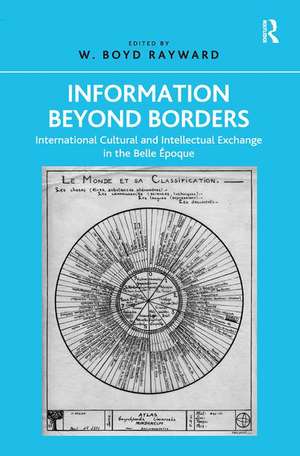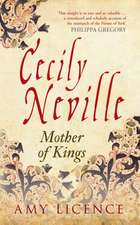Information Beyond Borders: International Cultural and Intellectual Exchange in the Belle Époque
Editat de W. Boyd Raywarden Limba Engleză Paperback – 18 dec 2017
| Toate formatele și edițiile | Preț | Express |
|---|---|---|
| Paperback (1) | 356.44 lei 6-8 săpt. | |
| Taylor & Francis – 18 dec 2017 | 356.44 lei 6-8 săpt. | |
| Hardback (1) | 1115.99 lei 6-8 săpt. | |
| Taylor & Francis – 25 mar 2014 | 1115.99 lei 6-8 săpt. |
Preț: 356.44 lei
Nou
Puncte Express: 535
Preț estimativ în valută:
68.20€ • 71.40$ • 56.43£
68.20€ • 71.40$ • 56.43£
Carte tipărită la comandă
Livrare economică 05-19 aprilie
Preluare comenzi: 021 569.72.76
Specificații
ISBN-13: 9780815399711
ISBN-10: 0815399715
Pagini: 336
Dimensiuni: 156 x 234 x 22 mm
Greutate: 0.45 kg
Ediția:1
Editura: Taylor & Francis
Colecția Routledge
Locul publicării:Oxford, United Kingdom
ISBN-10: 0815399715
Pagini: 336
Dimensiuni: 156 x 234 x 22 mm
Greutate: 0.45 kg
Ediția:1
Editura: Taylor & Francis
Colecția Routledge
Locul publicării:Oxford, United Kingdom
Notă biografică
W. Boyd Rayward is Emeritus Professor at the Universities of New South Wales, Sydney, Australia and Illinois at Urbana-Champaign, USA.
Cuprins
Introduction, W. Boyd Rayward; Chapter 1 Of Artifacts and Organs, Frank Hartmann; Chapter 2 The Formation of Global News Agencies, 1859–1914, Volker Barth; Chapter 3 “In the Pursuit of Colonial Intelligence”, Heather Gaunt; Chapter 4 Divided Space—Divided Science? Closing and Transcending Scientific Boundaries in Central Europe between 1860 and 1900, Jan Surman; Chapter 5 Scholarly Networks and International Congresses, Paul Servais; Chapter 6 Organizing a Global Idiom, Markus Krajewski; Chapter 7 Beyond Babel, Fabian de Kloe; Chapter 8 Laboratories of Social Thought, Christophe Verbruggen, Julie Carlier; Chapter 9 Sociology in Brussels, Organicism and the Idea of a World Society in the Period before the First World War, Wouter Van Acker; Chapter 10 Collecting Paper, Nader Vossoughian; Chapter 11 Alfred H. Fried and the Challenges for “Scientific Pacifism” in the Belle Époque, Daniel Laqua; Chapter 12 Global Government through Science, Geert J. Somsen; Chapter 13 Dynamics of Networks and of Decimal Classification Systems, 1905–35, Charles van den Heuvel; Chapter 14 The Great Classification Battle of 1910, Mary Carroll, Sue Reynolds; Chapter 15 From Display to Data, Dave Muddiman; Chapter 16 An Information Management Tool for Dismantling Barriers in Early Multinational Corporations, Alistair Black;
Recenzii
’Historians are showing that the globalization of information is not a unique historical feature of the contemporary era, but a recurrent construction possessing many facets and unsuspected properties - including a longstanding utopian element. The contributors to this fine collection unearth a revealing series of cultural, intellectual, and technological projects to universalize information systems during the decades before World War I and, in the process, give us new ways of understanding the lineages of our own time.’ Dan Schiller, University of Illinois, Urbana-Champaign, USA 'There is so much in this book ... the complexity and range of ideas discussed here is remarkable, and it is all tremendously engaging.' Library and Information History 'Information Beyond Borders is an excellent example of intellectual information history at its finest. It offers a new lens through which to view a period of history already well studied, and shows us that the emergence of the modern information world was inexorably caught up with deeper historical forces, tensions, and aspirations.' Library and Information History
Descriere
This book analyzes the dynamics of the emerging networks of individuals, organizations, technologies and publications by which means information was exchanged across and through all kinds of borders and boundaries in this period. It extends the frame within which historical discourse about information can take place by bringing together scholars not only from different disciplines but also from different national and linguistic backgrounds. It will be of interest to scholars and students of information history and the emergence of the information society as well as to social and cultural historians concerned with the late 19th and early 20th century.














